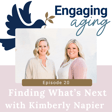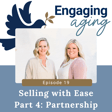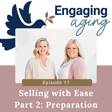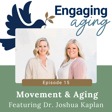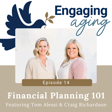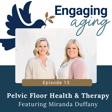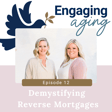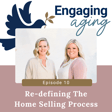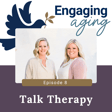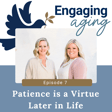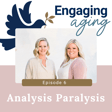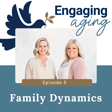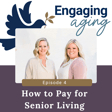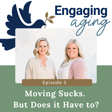Become a Creator today!Start creating today - Share your story with the world!
Start for free
00:00:00
00:00:01

Helicopter Adult Children: Detrimental to the Older Adult
Are your kids hovering over you, taking away your independence? Or are you an adult child who feels they need to be constantly overseeing your aging parent? Join Erin and Lauren as they take a deep dive into this common scenario experienced by many families. No one is to blame! Learn the small shifts you can make to ensure everyone’s safety and improve your relationship.
Transcript
Introduction to 'Engaging Aging'
00:00:07
Speaker
Welcome to Engaging Aging with Erin and Lauren. Join us as we share laughter, tears, and demystify the realities and silver linings that occur later in life.
Helicopter Adult Children
00:00:21
Speaker
Welcome back to today's episode where we are going to be talking about helicopter adult children.
00:00:27
Speaker
I love this topic. As a mother of four young children and my generation of what we refer to as helicopter parents, it hit me like a ton of bricks. I think you, Lauren, were the first person that maybe
00:00:43
Speaker
I don't know who we were with when we heard the topic that adult children can oftentimes just be like helicopter parents.
Impact of Overprotective Parenting
00:00:51
Speaker
Well, it's so interesting. We heard somebody say that and we thought we have literally seen this happen so many times in
00:01:00
Speaker
All of our conversations. Yeah, I when I think I was expecting my first child someone gave me a really amazing book called robbing your children of their childhood and essentially It's about the idea that when we step in and overtake experiences from our kids and
00:01:20
Speaker
it stops their really important developmental stages. So I think the preface talked about a newspaper. Previous generations, a child would be given a newspaper and expected to use their imagination and their skills to either make a paper airplane or read the comics or make a hat out of it or a boat or whatever.
00:01:44
Speaker
And that when we step in with over activities for our kids or another example given was when they literally fall off of a rock at age like three or four when they're learning their independence and their skills and we're right there to scoop them up and tell them it's
Client Story: Over-involved Daughter
00:02:01
Speaker
okay.
00:02:01
Speaker
They don't get the opportunity to build the skill set of truly standing back up, brushing themselves off, and learning that, yes, they can actually do this successfully on their own. And all of those points, I think, are transferable to older adults when kids swoop in, overcompensate. It all comes from a place of love.
00:02:25
Speaker
and guilt why people do it because maybe they feel guilty that they're not there. And it's amazing. I don't think that most adult children actually know that they're doing it because it comes from that place of love and maybe guilt or just wanting to
00:02:41
Speaker
help them, right? If you think about a mother watching their child at the playground and seeing them maybe fall or stumble or someone bullying them, you naturally, yeah, comes from a place of love. You want to step in and take the pain away. But what you don't realize is those pain points are part of our developmental stages. And we don't often think about aging as a developmental stage.
00:03:08
Speaker
And yet it absolutely is. And we could be robbing our older adult loved one on some really important life lessons.
Father's Voice Silenced
00:03:16
Speaker
Do you have any examples of that with your clients? I do. It's actually really interesting because I was on a client meeting a couple of weeks ago and training a new project manager of ours. And we say in our training, we give this example of how to really engage the older adult in the conversation.
00:03:32
Speaker
And from the moment that we walked in that door, it hit us like no other. It was this cloud of just, you could tell this daughter has, for years, seen what's been going on with her parents. They've been aging. He has Parkinson's disease. She has dementia. And she was trying to cover up the reality of it, right? Her mother and father, or she herself had dementia? For her mother and father.
00:04:01
Speaker
And you could just see that she kind of thought, like, here are some professionals coming in. What are they going to see? And she introduced us to them and immediately just started taking over. We sat at that kitchen table. And as we always do and how we engage our clients, we immediately thanked everybody for welcoming us into their home.
00:04:26
Speaker
And because that can be a very
Love, Guilt, and Independence
00:04:28
Speaker
vulnerable time, right? And we automatically start engaging with the client. But you can see that adult daughter just interjecting every single time. So we would ask, tell us a little bit about your family and your home. And what I found is that that adult daughter would just
00:04:49
Speaker
answer for her parents. And she didn't really understand kind of what that approach was. And that's okay. She really shouldn't necessarily. But as time went on, kind of opened that up. So some perfect examples. You know, I would say, Tell me a little bit about what you love to do. And she would answer that for her dad.
00:05:10
Speaker
And I could tell the entire time he just sat there, and as mentioned before, he has Parkinson's disease, so he was just kind of very still, clamming up, didn't know what to say, and I just kept looking at him in his eyes and engaging with him, and you could tell he wanted to talk.
00:05:26
Speaker
So was that frustrating the daughter?
Training Insight
00:05:28
Speaker
Was she like, whoa, whoa, whoa, whoa, you're overstepping? I don't think she knew at all. I really didn't think that she knew what she was doing because she wanted to try and help her parents, right? She was in that role to help them start to plan their process for their move.
00:05:44
Speaker
start to look at everything that they have in their house. And I think she had an agenda on her mind of what she wanted to accomplish during that time. And just so nicely, I had to say, our process is really to get to know you and you to get to know us. Let's take this a little bit of a step back. But she just wanted to insert herself. The reason I bring this up is because not everybody knows that we're doing that, right? And so I mentioned we were training a project manager while we were doing that.
00:06:12
Speaker
And her comment to me when we walked out of that door was, he just wanted to talk. And he wanted to share his story. He wanted to share his story when he was sitting in his... And he was robbed of that experience by the daughter helicoptering, inserting herself and her agenda, what was important to her, and not allowing him the autonomy to... And even if he failed, even if he struggled to find the words or
00:06:38
Speaker
Those were some challenges and it allows him, and I think that's the biggest challenge we see with these scenarios.
Balancing Protection and Experience
00:06:45
Speaker
They're not meaning to, but they're taking away the opportunity for that older adult to have their independence in that moment in alignment with what's important to them.
00:06:55
Speaker
But I could tell from that adult daughter, it was coming from that place of love, right? She wanted everything to go so perfect. She knew that this was going to be a really challenging time for both of her parents. They had lived in that house for 46 years.
00:07:11
Speaker
they had brought their, you know, they raised their kids there. I'm gonna start to cry. And this is what happens over time. You know, even their belongings, they had done a really good job of starting to downsize, but you could tell that there were a lot of emotions there and she, there was guilt too, right? Like, am I making the right decision of all these places that I've gone to see for my parents? Is this the right decision for them, for our family? Is it the right time?
00:07:40
Speaker
And I don't think we always have a crystal ball to know that. I also think one of the reasons the causes for the helicopter approach is protection. Because this is heavy and it's overwhelming and it's challenging, we love our parents. Who do we love more than our children and our parents? Absolutely. Maybe we should love our spouses as much, but we want to protect them from pain and fear and those heavy emotions. And so by swooping in,
00:08:05
Speaker
as though we feel like we're protecting them, we're not allowing them to feel and to go through.
Catharsis in Challenge
00:08:11
Speaker
One of my favorite children books that I read often talks about you can't go over it, you can't go under it, you have to go through it and we say that with our clients and we have to go through it and although we think we're being helpful to helicopter and protect from it,
00:08:27
Speaker
We're not always, by allowing our parents to go through it, they're building their own resilience. They're seeing that they are able to have that experience. And, you know, how many times do we see this is a very cathartic experience by going through your belongings, your emotions and your possessions when done correctly. You will come out better on the other end than trying to just fake it until you make it and get through.
00:08:51
Speaker
And I just want to be clear, I don't think that we're staying here today as an adult child that you shouldn't be helping your parents, right? It's just being more mindful of
00:09:02
Speaker
What is my role here? And who are they? Because even with dementia or some sort of cognitive impairment, they are still inside, right? They still have a purpose. They still have a voice. They know what they've wanted to see for their future. And it's really important for them to be part of that process.
Over-support and False Independence
00:09:23
Speaker
And so when you say, you know, robbing them of things, it's really just that we're trying to overinsert ourselves sometimes to make it easier for our parents
00:09:32
Speaker
But have we truly taken the time to sit and just listen to? What do you want? And the flip side, I've seen
00:09:42
Speaker
When you're doing it all for them, your parents actually may have a false sense of independence and security that they're really not as able as they think they are. Such a great point. Because you're providing so much support that in their mind, I'm fine. I'm living successfully independently at home. Well, mom or dad, you are because I'm providing the meals. I'm there four days a week doing the housekeeping. I'm now assisting you with a shower.
00:10:08
Speaker
And so when we helicopter in that way by over supporting, we may be giving a false sense. So it's not just make robbing someone of their independence. You may be actually falsely inflating their independence.
Caregiving Roles and Societal Change
00:10:20
Speaker
And that is really hard to do. We've had conversations with clients, maybe pull back the support and allow them
00:10:29
Speaker
to fail so that they can start to see in their own eyes some of those deficits, which is very hard to do. But to your point about raising kids, too, allow them to fall a little bit, not so that they're going to hurt themselves, but let them learn from those experiences, right? There are silver linings. My mother gave me the best parenting advice. My first born was about three years old at the time, and it was freezing out. It was snowing. We're here in New England.
00:10:56
Speaker
and she refused to put her winter coat on. And so I'm arguing with her, it's cold out. I'm using my rational thinking, put your coat on, it's cold out. And my mother said, let her go outside without her coat and she will, on her own, realize it's cold and I need to put my coat on. And I think we've had that example. We've had clients with cognitive impairment with the adult children.
00:11:19
Speaker
are saying, no dad, that doesn't make sense, you shouldn't do that. Allow folks to fail. It's okay, it's not the end of the world, honestly. And give yourself some grace. I think we say that a lot. No one has a book on this. No one has a parenting book. No one has an adult daughter. Support caregiver. Even if there was a parenting book on this or what not to do, you've gotta find your own rhythm and no two situations are exactly the
The Unsustainability of Hovering
00:11:48
Speaker
same.
00:11:48
Speaker
I think we see that every single day. And finding your reasoning, get really clear with yourself. Why am I acting as a helicopter adult child right now? What are my biggest fears? What are my concerns? Why am I stepping into this role? Am I overcompensating? So the number one reason why this generation of parents are helicopter because they're overcompensating because they're not home as much as they once were.
00:12:13
Speaker
I have a question for you. Just thought about this. Do you think in some situations
00:12:20
Speaker
the adult child becomes a helicopter adult child because that's what they had growing up. They had helicopter parents. Probably not, and here's why. Their generation was kind of the latchkey kids. My grandmother used to joke. They told their kids to come home when the street lights came on. A lot of these older adults, literally their kids were out all day doing God knows what. There was no cell phones, there was no checking in.
00:12:47
Speaker
I think it's more about, I think, women entering the workforce full time in the women's lib movement in the 70s and not being there to get the kids off the bus or to bring in the parent into their home. If you think about it, since the beginning of human time, when we lived in caves, we had multiple generations all under one roof. The matriarch of that family, the adult daughter, was usually the caregiver to the children and the caregiver to the older adult.
00:13:14
Speaker
That person in many circumstances is now not in the home and not able to step into that role. So when she is available, she's overcompensating. We have so many clients in this sandwich generation. They have responsibilities not just for their mature parent and their child. So they're pulled in so many directions. So the idea of being over on top on everything
00:13:41
Speaker
feels like you're doing as much as you can. But in another topic, we'll discuss this. That's
Balancing Caregiving and Personal Life
00:13:47
Speaker
going to burn you out. You're not good to anyone. And the helicopter situation is exhausting. It's all about the needs of the person you're hovering over and not about your own individual needs. So it's not sustainable. It's not great for the recipient on the other end. And it's not great for you.
00:14:04
Speaker
I think it's so important that you just mentioned that because I'm thinking just on a personal level and she would not mind me sharing this. I had this conversation with my mom the other day. You know, I'm in denial that my grandparents are aging.
00:14:16
Speaker
And I do this every single day. I'm around this. And she is the only daughter of four. And she feels as though it's that daughter's responsibility to assume everything. Was that modeled to her by her mother? Was her mother the caregiver? Yeah.
00:14:34
Speaker
and her mother's mother. And yeah, so she assumes that role. But I think it's society, too, that the daughter always kind of takes care and takes over of the doctor's appointments and, you know, just making sure that they have meals and making some of those decisions. And her brothers make some of, you know, help out, too, by all means.
00:14:56
Speaker
But it's just interesting to see the role that she feels as though she has to assume what that has done for her personal life. But the kicker is my grandparents really don't need that right now.
00:15:10
Speaker
So she's over inserting herself. She is becoming that helicopter daughter in a lot of ways. But when I really look at the reason why, she's not ready to lose them. None of us are. And so we are, I think, afraid to talk about
00:15:29
Speaker
The finality of all of this. Well, can we also talk about your mother has probably been a caregiver to her children and other people in her life. You're all independent, but as you lose that role in other aspects, she's overcompensating in other areas. So it's back to really why, Mom, why do you find you've stepped in? If they don't need you now, why are you putting yourself in that role? And I think that's where we don't take a minute to breathe, stop.
00:15:56
Speaker
and really do some self analysis on our own behaviors and why we're stepping into that. I grew up on a farm. I did not have a helicopter parent. And it's interesting. My approach to my children is very hands off, allowing them to scrape their knee. And it almost feels like unreal to other parents like you would let them
00:16:15
Speaker
or ride their bike on their own. And I think part of the many gifts I've been given through working with older adults is seeing how overcompensating can hurt you and giving the gift to others to allow them to take a minute back off and allow your parent to get clear on what they need and then insert
Empowering Through Professional Support
00:16:35
Speaker
yourself. You know, most of our listeners right now are probably saying this all sounds great.
00:16:38
Speaker
and maybe identifying right now with, okay, maybe I'm over inserting myself a little bit. I remember when you and I first met and we were working on a client case together. It was with helicopter adult children and we were sitting in a coffee shop and we hadn't met older adults yet. I'm glad you have a great memory because I don't.
00:17:00
Speaker
This will come back to you. We were sitting in a coffee shop and it was the adult children and their spouses. There were four of them and it was the two of us and we sat there and we listened to the entire story and there was a lot of negativity. Mom and dad are never going to talk to you. They are never going to embrace taking this next step. And one of the most powerful things that you said was
00:17:26
Speaker
Thank you for your time. And you heard them, you listened to them, right? Allow them to get that out. But you encourage them to take a breath, take a step back. Your parents don't necessarily want to hear this from your children, right? It's that whole role reversal piece, which we can get into too.
00:17:48
Speaker
To be able to see that and see the adult children react to that and then see it all come to fruition on the other end after weeks and months of working with them, I think the adult children really gave gratitude to you for taking that moment, giving them the space to breathe, and to say it doesn't have to come from you. There's a lot of professionals around that you can bring into your support network to really
00:18:17
Speaker
help with this.
Emotional Presence and Task Management
00:18:19
Speaker
So it empowered the adult children, but it also empowered mom and dad in that moment and the success of that grew. You just helped them reframe what are their roles in this? It's that reframing. I think it's no one is you. No one's going to love your parent as much as you love them. No one's going to do as good of a job as you would do. So you step into it and overcompensate because you're probably pretty good at it as well.
00:18:47
Speaker
But where are you depleting yourself? So when you're burnt out from overcompensating in certain caregiving role or tasks, you're not able to be fully present as the emotional adult daughter. Maybe you're not able to sit over a cup of tea and share belly laughs with your mom because you're busy throwing in a load of laundry or scheduling her doctor's appointments. So yeah, where is that balance where you can establish trust with people to hand over some of those tasks?
00:19:14
Speaker
so that you can be overly present in the emotional way that your loved ones need you to be. And that that's not easy. I always say it's a gift. There's no such thing as balance. I just want to call this out real quick. As a working mother of four young kids, there's no such thing as balance.
Open Conversations and Elder Autonomy
00:19:29
Speaker
It's a seesaw. And you have to choose where is your energy and time being spent. And some days one is going to outtake the other. So some days your mother
00:19:40
Speaker
sharing laughter or tears over a cup of tea with you is much more successful and needed than the list of tasks that were supposed to be done that day. So you can't do it all. You can't manage all the tasks and be emotionally present, but you can pick and choose which side of the seesaw you choose to be on today. And that's for anyone. Each day chooses. If you're crushing it in your personal life,
00:20:03
Speaker
Your professional life may be challenged and vice versa, and it's okay. We have to lighten up and ask for help when needed and notice when we're depleted. Yeah, that is so true. So true.
00:20:15
Speaker
I think the other important thing is too is, and we're gonna talk about this right in other episodes, but how do you even start the conversation knowing too that your thoughts for your parents and what's best for them may not be what's best for them. How do you put aside your own feelings, emotions, thoughts, what should happen?
00:20:36
Speaker
and really understand what's good for them. And calling it out, I say this all the time, this is my favorite quote, my father always says, if you can't hide it, paint it red. If you notice that you're a helicopter adult child right now,
00:20:53
Speaker
That's when you say, mom, I know about it. Yeah. Mom, I know I'm a lot. Swooping in. Yeah, I know I'm a lot. It's because I love you. Where do you need me most? Let them have the autonomy to identify, where do you need me to be? And then if you need to be a helicopter in that space of their life, do it if that's what's in alignment with you. But ask for their permission on where they need you to be and own it.
00:21:18
Speaker
You know, if you can't hide it, paint it red. If that's your personality, it's all good. It is. Listen, I think we could talk about this topic all day long. I know that there is so many situations and scenarios. But I think that there's other topics that, you know, we're going to kind of bring this back together.
Conclusion and Future Topics
00:21:35
Speaker
So thank you. Yes. Keep on. Yeah. Keep it on. Yeah. All right.
00:21:43
Speaker
Thank you for joining us today. To continue the conversation, follow us on social media at Dovetail Companies or visit us online at dovetailcompanies.com. And remember, change can be difficult if aging doesn't have to be.
